Top 3 Agent Recognition Tips for Improving First Call Resolution
As most call center managers know, motivating Agents to use the desired customer experience (CX) behaviors to achieve world class FCR and retaining the best Agents are significant challenges. An effective recognition program will greatly help management motivate Agents to excel at providing FCR at the world class level and retain the top FCR performing Agents.
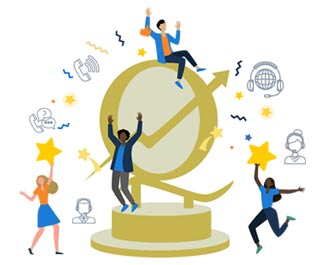
40% of customers whose call was not resolved felt the Agent could have done more to resolve their call and prevent them from having to call back. In many cases, the Agents were not motivated to use the desired CX behaviors or 'go the extra mile' to resolve customer calls. In other words, from a customer's point of view, it was a will issue rather than a skill issue.
SQM's research shows that one of the top reasons Agents leave an organization is that they are not recognized for their work. Most managers fail to recognize the impact that lack of recognition has on FCR rates, in addition to motivating and retaining Agents.
Sources of Error for First Call Resolution
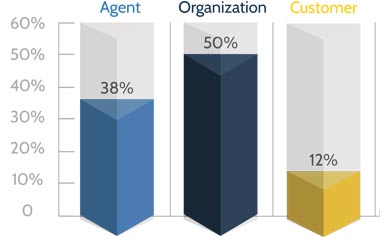
SQM's research analysis shows that call center sources of error (SoE) for not achieving First Call Resolution (FCR) are primarily due to the Agent or the organization. The results of SQM's analysis specifically shows that 38% of customer calls that did not achieve FCR were due to the Agent, 50% were due to the organization, and 12% were due to customer errors.
SQM's research has validated this analysis by asking the customer directly whether the Agent could have prevented the customer from having to call back. Customers felt that the Agent could have prevented them from making a second call 40% of the time, which closely aligns with SQM's analysis that the Agent is the SoE 38% of the time for not achieving FCR. In most cases, the quickest and surest way for FCR improvement to occur is to reduce Agent SoE repeat call reasons.
Again, the organization SoE for repeat call reasons is 50%. So, improving FCR by focusing on organization SoE issues represents a tremendous opportunity for the call center industry to improve FCR performance. However, many call centers are not very good at identifying organizational issues that hinder their FCR performance. Call centers are also not very good at improving processes that involve organizational issues that the call center management team has no control over. SQM defines organizational SOE as issues that Agents have no control over, such as repeat call reasons (e.g., policies, products, services, and technology).
Interestingly, the number one reason people leave an organization is due to a lack of recognition. Agent recognition should be provided by management, but it should also be provided by the peers they work with and the customers they serve.
The psychology of recognition can best be described by Maslow's hierarchy of needs. According to Bersin (2012), "two of the most valuable psychological needs we have as human beings are the need to be appreciated and the need to belong." Furthermore, Bersin (2012) stated, and SQM agrees, "compensation and benefits support basic human needs; however, recognition and career advancement support our higher-level psychological needs."
How Agent Recognition Works
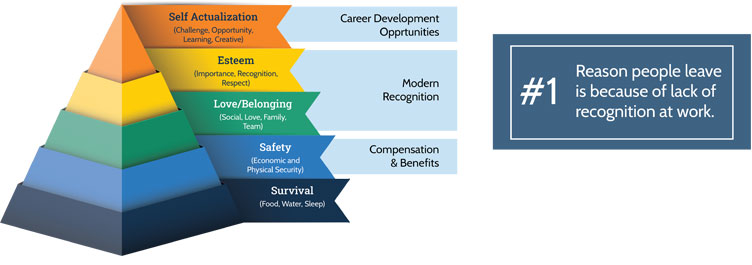
Motivating Agents to use the desired CX behaviors to achieve world class FCR and retain the best Agents is a great challenge. An effective recognition program can significantly help motivate Agents to excel at providing FCR at the world class level.
Recognition needs to be provided in a frequent, descriptive, impactful, and personal manner so that Agents know what they are being recognized for, and in turn, Agents will be motivated to continue using those behaviors.
SQM's research shows that when a call center uses voice of the customer (VoC) FCR measurement methods (e.g., post-call survey, etc.), the call center industry average for FCR rate is 70%. This means that 30% of customers have to call back to the organization about the same inquiry or problem. A good FCR rate is 70% to 75%. Of the 500 leading North American call centers that SQM benchmarks annually, only 5% are at the world class VoC FCR performance level of 80% or higher.
SQM clients performing at the world class FCR rate use the following recognition tips, or a variation thereof, for recognizing Agents:
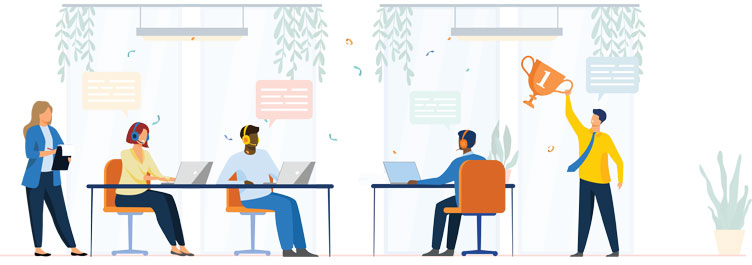
BE FREQUENT - Recognize Agents daily, weekly, monthly, quarterly, and annually for FCR, call resolution, CX improvement, and great performance. The more timely, consistent, and frequent, the better.
BE DESCRIPTIVE - Recognize Agents for specific behaviors they use to resolve a call or provide FCR and great CX. The more descriptive the feedback, the more the Agent will feel it is sincere.
BE IMPACTFUL - Focus Agent recognition on behaviors that positively impact FCR, call resolution, and CX performance. These are the behaviors (e.g., going the extra mile) you want the Agent to repeat.
BE PERSONAL - Know that each Agent is motivated by recognition differently. Do they prefer private or public recognition? Are they motivated by money, time off, belonging, recognition, personal development, or career advancement?
Top 3 Agent Recognition Tips for Improving FCR
A best practice for recognition investment is to spend 1% of an Agent's annual pay, or about $400 per Agent, per year. SQM has several award-winning clients who use an Agent recognition program to increase their FCR, call resolution, and customer satisfaction results.
We have identified the top 3 Agent recognition tips for improving FCR based on our CX research. For the top 3 Agent recognition tips, our world class FCR performing call centers recognize their Agents with frequent, descriptive, impactful, and personal feedback about their VoC survey results for FCR, call resolution, and customer satisfaction performance.
1. Rewards Recognition Tip

Agents earn reward points based on VoC survey results or positive behaviors exhibited in their daily customer interactions. Based on the VoC survey results, our mySQM™ FCR Insights software automatically awards reward points for Agent FCR, call resolution and customer satisfaction performance.
An Agent can also earn reward points for any type of positive behavior and contribution from their peers and supervisors. Frequently rewarding and recognizing positive behaviors motivates Agents and promotes repeated action. Agent points can be topped up using gamification and redeemed using SQM's debit card for rewards that matter most to employees. Our program is a quick approach to motivate Agents to improve FCR and provide great CX.
mySQM™ FCR Insights software helps to recognize Agents in a frequent, descriptive, impactful, and personal manner, making it a powerful tool for improving FCR, CX, employee retention, and lower operating costs.
2. Service Hero Recognition Tip
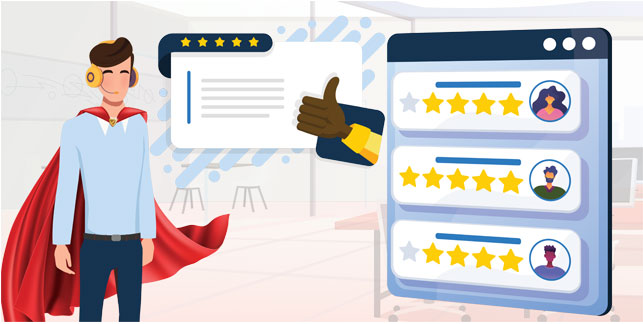
The Service Hero recognition program was introduced to SQM by a large American Health Care Insurance Plan. Agents are recognized as Service Heroes for providing exemplary CX. Agents receive frequent, descriptive, impactful, and personal feedback about being a Service Hero. This program has been used for many years and has long legacy capabilities, which can be a hallmark of an effective Agent recognition program.
The Service Hero recognition program highlights great CX stories delivered by Agents, which is shared with the organization's senior executives. Every quarter, exemplary calls are identified at all levels and are vetted by supervisors and managers working in the call center.
This group will listen to as many as 20 calls and then discuss, rank, and select the top 5 to 7 calls that the president and the senior executive team will listen to each quarter. The senior executives will also discuss, rank, and debate their rankings, which creates great discussions and new thinking about how to deliver a world class CX.
3. FCR/CX Certification Recognition Tip:
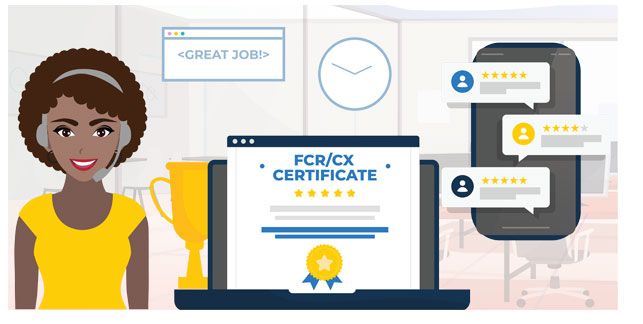
SQM's World Class Agent FCR/CX Certification Program is designed to determine if Agents are performing at the world class call resolution and customer satisfaction performance level. Our FCR/CX Certification program is the most credible and rewarding certification program in the call center industry because certification is based on VoC survey results.
Of all the recognition practices used for Agents, the one that has been the most effective at helping call centers improve or maintain their great FCR, call resolution, and customer satisfaction performance is our FCR/CX certification program.
The FCR/CX Certification program is very conducive for providing frequent, descriptive, impactful, and personal feedback because most Agents have 4 to 10 post-call surveys completed in a month on how they handled customer inquiries or problems. Using customer feedback to certify Agent performance is very motivating to them, and they highly value being recognized for their FCR, call resolution, and customer satisfaction performance.
Quick Related Links
First Call Resolution Definition First Call Resolution PPT First Call Resolution Benefits Employee Engagement First Call Resolution Operating Philosophy Call Handling Best vs Worst Agents Agent Recognition Celebrating Agent Success QA Form Customer Quality Assurance Survey Data Calculate First Call Resolution Rate What is a Good FCR Rate? VoC Closed-loop Top 10 CX Metrics Agent Recognition Case Study
